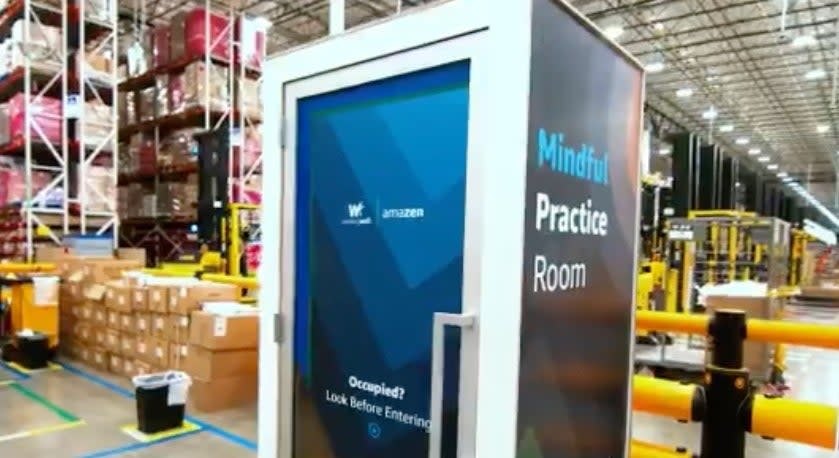Amazon’s new ‘AmaZen’ booths are a spiritually dark solution for late capitalism

The AmaZen booth has been widely mocked on social media
(Peter Macdiarmid/Getty Images)This week, Amazon rolled out a glossy promotional video for its ‘AmaZen’ initiative, phone booth-sized pods where employees can watch a “library of mental health and mindful practices to recharge the internal battery.”
I hope the AmaZen cubes come with excellent soundproofing, because if I was an Amazon employee, or perhaps more likely an overworked seasonal contractor, I would want to go inside, lock the door, and call outgoing Amazon CEO and world’s richest man Jeff Bezos a series of names unprintable in a fine family newspaper like The Independent.
“With AmaZen, I wanted to provide a place that’s quiet that people could go and focus on their mental and emotional well-being,” says Leila Brown, an Amazon employee who created the booths inspired by her “background in sports medicine” and “passion in alternative therapies”, in the video. A trio of chestnut horses munch on oats behind her at a ranch in Florida, because, um, wellness.
Presumably, unless Amazon is casting aside its famous zeal for automation and reverting to horsepower, this testimonial from Brown was not filmed inside an actual Amazon warehouse. There, the $254.2 billion company has a reputation for poor working conditions nearly as impressive as its perch as the second-most valuable brand in the world.
Workplace injuries inside Amazon warehouses are roughly two times the US average, according to the National Employment Law Project. Employees have said people regularly experience mental health crises on the shop floor, as workers often must take 10-plus hour shifts, where their every move and task is regulated in order to increase productivity. Under-performing personnel who don’t meet automated productivity targets or pause too long between lugging boxes are fired.
“You don’t get treated like a person,” Darryl Richardson, a 51-year-old employee at Amazon’s Bessemer, Alabama warehouse, told The Guardian. “They work you like a robot… You don’t have time to leave your workstation to get water. You don’t have time to go to the bathroom.”
The company, in a program perhaps outside of its worker wellness division, recently broke a union drive in Alabama with its famously hardball labour tactics.
Amazon has insisted in recent months that “the health and safety of our employees has always been Amazon’s top priority,” and plans to spend over $300 million over this year as part of its WorkWell initiative on workplace improvements like healthcare, instructions on stretching for repetitive motion injuries, healthy snacks, and AmaZen pods. But Amazon’s problem runs much deeper than a lack of carrot sticks and meditation closets.
The company’s business model — efficiency at all costs — is in constant tension with employee wellbeing. Barring substantial innovations, no company can be everywhere at once and growing all the time without squeezing its people. (Though to be fair, that’s the same health-wealth contradiction in basically every profit-driven enterprise under the gangster ethics of US capitalism, but that’s an argument for another column!)
The company has touted its drive to automate warehouses as a way to decrease injuries, but a 2020 investigation from Reveal found that Amazon “profoundly misled the public and lawmakers about its record on worker safety”. It also found that injuries were concentrated at facilities with more tech, not less.
Then there’s the way the money flows through the Everything Store. Employees’ lives might be better if they got some more cash. That’s not really how Amazon works, though.
The pandemic is an instructive example. The worldwide public health apocalypse was actually great for Amazon. It hit a record $386 billion in sales over the last year. Jeff Bezos personally became more than $67 billion richer, which, according to the Brookings Institution, is about 38 times the total hazard pay Amazon employees have received since the pandemic began. Over the summer, the company also ended its temporary $2-an-hour Covid wage increase in favor of occasional bonuses.
It bears repeating: Amazon has the resources to treat its people better. It’s the second-most valuable company in the world, run by the richest man in the world, and it’s also the fifth largest employer in the world. It’s not that Amazon doesn’t have the power to change; it just won’t.
This is where the spiritual darkness of the AmaZen booths and all other woo-woo corporate wellness drives reveal themselves. Rather than alter the material deficiencies — pay, time off, childcare, dignity — that make their workers miserable, they’d rather fiddle around with showy perks to placate people just enough to keep them efficient and the company’s brand inoffensive.
In that way, these programs are really meant to soothe the mental health of the executives, not the workers. Somewhere, deep down, these CEOs must know that when you’ve reached a point where you need to install meditation booths in robo-warehouses, it means something is fundamentally broken about the nature of modern work. At least, it’s fundamentally broken for some; for those at the top, everything seems to be humming along just fine.
Read More
Amazon create AmaZen mindfulness pods for employees
Boris Johnson could delay lockdown easing – he can’t afford any more mistakes
‘We may have to wait’: Cummings has given the PM pause for thought about the end of lockdown

 Yahoo News
Yahoo News 
